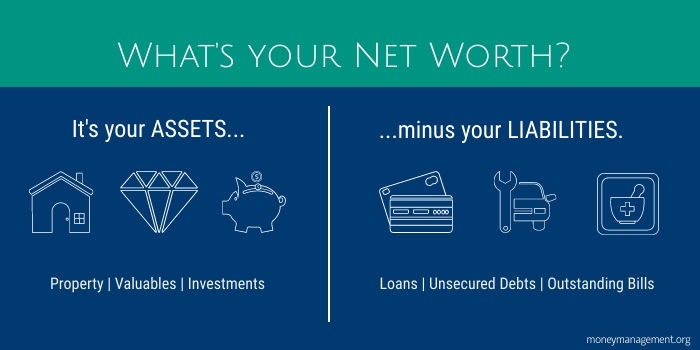How to Calculate Your Net Worth
How To Calculate Your Net Worth

by Jesse Campbell
What's your net worth?
It's fairly easy to find out the net worth of some of the world's wealthiest celebrities (whether that information is accurate is another matter altogether), but how much do you know about your own net worth? And why would you even need to know that?
CALCULATING YOUR NET WORTH
The actual calculation behind your net worth is pretty simple. The hard part is tracking down all the numbers that go into the equation.

Basically, your net worth is all of your assets minus all of your liabilities. It's the combined value of all your stuff with all the money you owe others subtracted out.
And yes, it can be a negative number (which isn't the worst thing in the world, and not necessarily a reason to panic).
WHAT ARE YOUR ASSETS?
If it's worth money, it's an asset. If it will be worth money someday, it's an asset. Some common examples:
- Cash - physical currency, digital currency, checking accounts, savings accounts, certificates of deposit, etc.
- Investments - retirement funds, stocks, pensions, bonds, mutual funds, etc.
- Property - land, houses, cars, boats, etc.
- Valuables - jewelry, collectibles, art, furniture, etc.
If you can spend it, cash it out, or sell it today (or tomorrow), it's an asset.
WHAT ARE YOUR LIABILITIES?
Your liabilities are essentially what you owe to others. Examples include:
- Creditor debt
- Mortgage debt
- Student loan debt
- Taxes owed
- Business debt (if you own your own business)
- Outstanding bills
Ideally, your assets should outweigh your liabilities, but that may not always be the case. If you owe a lot in student debts, for example, you may have more liabilities than assets, but that should shift with time.
WHEN DO YOU NEED TO KNOW YOUR NET WORTH?
On a day-to-day basis, your net worth probably doesn't mean all too much. As long as you can cover your expenses and sock away a little for savings, you're probably doing okay.
Over time, however, net worth can be a useful barometer of your financial progress. While we don't all strive to be rich (nor should we), you do ultimately want the needle pointing up. If your liabilities outweigh your assets and that trend is steadily pointing down instead of up, you may need help figuring out how to adjust your strategy.
Similarly, if you want to grow your assets, but find that things aren't your net worth isn't growing year over year, you may need to rethink how you spend your money.